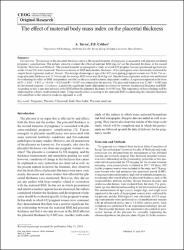| dc.contributor.author | Turan, Abdulkadir | |
| dc.contributor.author | Çeliker, Fatma Beyazal | |
| dc.date.accessioned | 2020-12-19T19:40:48Z | |
| dc.date.available | 2020-12-19T19:40:48Z | |
| dc.date.issued | 2019 | |
| dc.identifier.citation | Turan, A. & Çeliker, F.B. (2019). The effect of maternal body mass index on the placental thickness. Clinical and Experimental Obstetrics & Gynecology, 46(2), 274-276. https://doi.org/10.12891/ceog4742.2019 | en_US |
| dc.identifier.issn | 0390-6663 | |
| dc.identifier.uri | https://doi.org/10.12891/ceog4742.2019 | |
| dc.identifier.uri | https://hdl.handle.net/11436/1648 | |
| dc.description | WOS: 000474747400019 | en_US |
| dc.description.abstract | Introduction: the increase in the placental thickness (mm) in the second trimester of pregnancy is associated with placenta-mediated pregnancy complications. the authors aimed to evaluate the effect of maternal BMI (kg/cm(2)) on the placental thickness in the second trimester. Materials and Methods: the second trimester is a prospective study in which 832 pregnant women (gestational age between weeks 18 and 24) were examined. the measurements of BMI and placental thickness of the participants were statistically evaluated by simple linear regression analysis. Results: the average chronological age of the 832 participating pregnant women was 28.64. the average placental thickness was 25.30 mm and the average BMI value was 26.46 kg/cm(2). Simple linear regression analysis was performed for evaluating the effect of BMI (independent variable) on the placental thickness (dependent variable). A regression equation in the form of [F (1.830) = 5.833; p = 6 < 0.05] and R-2 = 0.007 was obtained in the analysis. the placental thickness was 23.063 +/- 0.085 mm for the second trimester. Conclusion: A positively significant linear relationship was observed between the placental thickness and BMI. According to this, a one-unit increase in the BMI affects the placental thickness by 0.085 mm. the importance of these findings will be understood in a future result-oriented study. Using modifications according to the maternal BMI in calculating the placental thickness will contribute to the sensitive medicine approach as well. | en_US |
| dc.language.iso | eng | en_US |
| dc.publisher | 7847050 Canada Inc | en_US |
| dc.rights | info:eu-repo/semantics/openAccess | en_US |
| dc.subject | Pregnancy | en_US |
| dc.subject | Placenta | en_US |
| dc.subject | Ultrasound | en_US |
| dc.subject | Body mass index | en_US |
| dc.subject | Precision medicine | en_US |
| dc.title | The effect of maternal body mass index on the placental thickness | en_US |
| dc.type | article | en_US |
| dc.contributor.department | RTEÜ, Tıp Fakültesi, Dahili Tıp Bilimleri Bölümü | en_US |
| dc.contributor.institutionauthor | Turan, Abdulkadir | |
| dc.contributor.institutionauthor | Çeliker, Fatma Beyazal | |
| dc.identifier.doi | 10.12891/ceog4742.2019 | |
| dc.identifier.volume | 46 | en_US |
| dc.identifier.issue | 2 | en_US |
| dc.identifier.startpage | 274 | en_US |
| dc.identifier.endpage | 276 | en_US |
| dc.relation.journal | Clinical and Experimental Obstetrics & Gynecology | en_US |
| dc.relation.publicationcategory | Makale - Uluslararası Hakemli Dergi - Kurum Öğretim Elemanı | en_US |


















